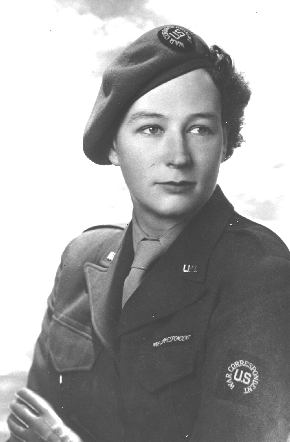Page 91
[Begin Tape 1, Side A]
Kasper: So, you have a French Legion of Honor Award that was given in 1945; the French Médaille de la Reconaissance given in '46; and then, of course, the U.S. Medal of Freedom, also given in '46. And I'd like you talk a little bit about that because those are very substantial awards.
Kirkpatrick: Well, I don't know. The Legion of Honor was presented to me by Madame Bidault, the wife of the Foreign Minister, in a very simple ceremony at the Quai d'Orsay, the French Foreign Ministry, and there was a luncheon that followed it.
Kasper: Why were you chosen to get this?
Kirkpatrick: I don't know why. I don't know why. I suppose because I had been reporting on the Free French and De Gaulle was the President, at that point, of France. I was known as a strong advocate of France during the war and was in France then, had been there as a correspondent; they gave a number of them to correspondents. It was sort of handed out, you know. An awful lot of French have them.
Kasper: Yes, but not that many Americans have them.
Kirkpatrick: Oh, a fair number, I think. And the Médaille de la Reconaissance—I don't really know. I suspect probably that my friend, Louis de Cabrol, initiated it, inasmuch as I had gone and plucked him out of a British hospital and gotten him down to an American hospital and an American surgeon had saved his knees so that he was able to walk and ride horseback thereafter. I don't know. I never knew and, as a matter of fact, I don't recall it being presented. Maybe it was.
The Medal of Freedom was given to me at the Pentagon by General Collins, who was then the Chief of Staff of the Army, with General Bradley, I think he was the Chairman of the Joint Chiefs, standing by. My name had apparently been on a list of correspondents who received it, and I'd been away at the time that they all got it, so that's—
Kasper: And what were the reasons that you were awarded the U.S. Medal of Freedom?
Kirkpatrick: Well, I'd have to look up the citation to know.
Kasper: Well, what's your best guess?
Kirkpatrick: I really don't know.
Kasper: Well, it was for your war correspondence presumably.
Kirkpatrick: Yes. Presumably, yes.
Kasper: Yes, and was there anything heroic in there, was that the reason?
Kirkpatrick: No. No.
Kasper: It was just because you had covered the war.
Kirkpatrick: I guess. I can't think of any—I can't think how the citation read. Again, that's at Northhampton. Everything we really want is there. I can look it up.
Kasper: That reminds me. I'm going to shut this off for a second.
[Tape interruption.]

